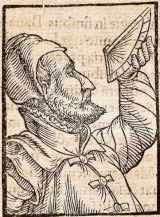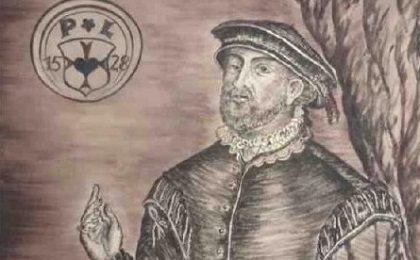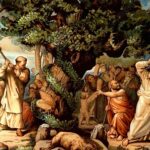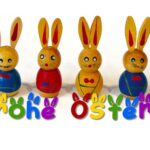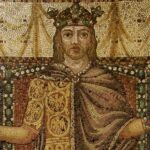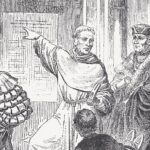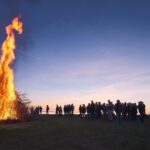October 22
Feast Day of St. Cordula
Little is known of St. Cordula who was a very early Christian in Cologne. She is said to have been a member of the following of St. Ursula. She is believed to have been martyred by the invading Huns. Her relics are in a shrine in the Johanniterkirche in Cologne. St. Albertus Magnus spoke of her as a saint in 1278. Her designation as a saint precedes the practice of canonization by the Pope.
October 22, 1511
Birth of Erasmus Reinhold in Saalfeld, Saxony. He was a German astronomer and mathematician, considered to be the most influential astronomical pedagogue of his generation. He was educated, under Jacob Milich, at the University of Wittenberg, where he was first elected dean and later became rector. In 1536 he was appointed professor of higher mathematics by Philipp Melanchthon. In contrast to the limited modern definition, “mathematics” at the time also included applied mathematics, especially astronomy. Reinhold knew about Copernicus and his heliocentric ideas prior to the publication of De revolutionibis and made a favorable reference to him in his commentary on Purbach. However, Reinhold (like other astronomers before Kepler and Galileo) translated Copernicus’ mathematical methods back into a geocentric system, rejecting heliocentric cosmology on physical and theological grounds.
October 22, 1650
Death of Petrus Lotichius Secundus in Heidelberg, Germany. He was a professor of medicine at the University of Heidelberg but is much more remembered as a poet of the Renaissance period. He wrote in Latin.
October 22, 1859
Louis Spohr dies in Kassel. Born Ludwig Spohr, he was a German composer, violinist and conductor. Highly regarded during his lifetime, Spohr composed ten symphonies, ten operas, eighteen violin concerti, four clarinet concerti, four oratorios and various works for small ensemble, chamber music and art songs. Spohr was the inventor of both the violin chinrest and the orchestral rehearsal mark. His output occupies a pivotal position between Classicism and Romanticism, but fell into obscurity following his death, when his music was rarely heard. The late 20th century saw a revival of interest in his works, especially in Europe.
October 22, 1854
Death of Jeremias Gotthelf in Lützelflüh, Switzerland. Jeremias Gotthelf was a pseudonym chosen by the pastor, Albert Bitzius. His books were intended to extend his duties as a pastor and stress religion and conservative values. Noted works by Gotthelf include Die schwarze Spinne, Uli der Knecht, and Leiden und Freuden eines Schulmeisters.
October 22, 1824
Johann Wolfgang von Goethe and Heinrich Heine meet in Weimar.
October 22, 1811
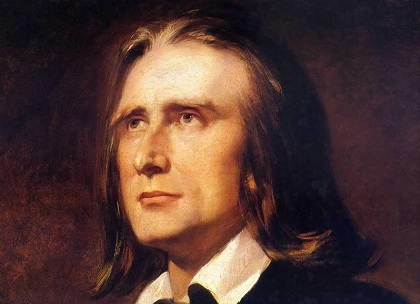 Birth of the composer, Franz Liszt, in Raiding, Hungary. A Hungarian by birth, Liszt spent relatively little of his life in Hungary. The majority of his life was spent in Austria, France, Germany and Italy. He was taken to Vienna to study music at age 10. There he studied with Karl Czerny and Antonio Salieri. After his Paris years he settled for several years in Weimar, Germany (1848-1861). In terms of composition, these were his most productive years. After Weimar he lived for a number of years in Rome. His last years were spend moving between Budapest, Rome and Weimar. His daughter, Cosima, was married to the conductor Hans von Bülow and later to Richard Wagner. Liszt died while at the Wagner festival in Bayreuth, Germany, in 1886.
Birth of the composer, Franz Liszt, in Raiding, Hungary. A Hungarian by birth, Liszt spent relatively little of his life in Hungary. The majority of his life was spent in Austria, France, Germany and Italy. He was taken to Vienna to study music at age 10. There he studied with Karl Czerny and Antonio Salieri. After his Paris years he settled for several years in Weimar, Germany (1848-1861). In terms of composition, these were his most productive years. After Weimar he lived for a number of years in Rome. His last years were spend moving between Budapest, Rome and Weimar. His daughter, Cosima, was married to the conductor Hans von Bülow and later to Richard Wagner. Liszt died while at the Wagner festival in Bayreuth, Germany, in 1886.
October 22, 1859
Birth of Karl Muck in Darmstadt, Germany. An orchestra conductor, Muck attained the reputation of master of the music of Richard Wagner. Just before the outbreak of WWI Muck had become the director of the Boston Symphony Orchestra. He was, however, interned as an enemy alien from 1918 to 1919. Thereafter he returned to Germany to conduct the Hamburg Symphony Orchestra.
October 22, 1965
Death of Paul Tillich in Chicago. Tillich was a Protestant theologian who sought to integrate traditional Christianity and modern life. He was an early opponent to the Nazis. He was the first non-Jew to be barred from academic appointments in Germany. He immigrated to the U. S. and taught first in New York and then at the University of Chicago.
